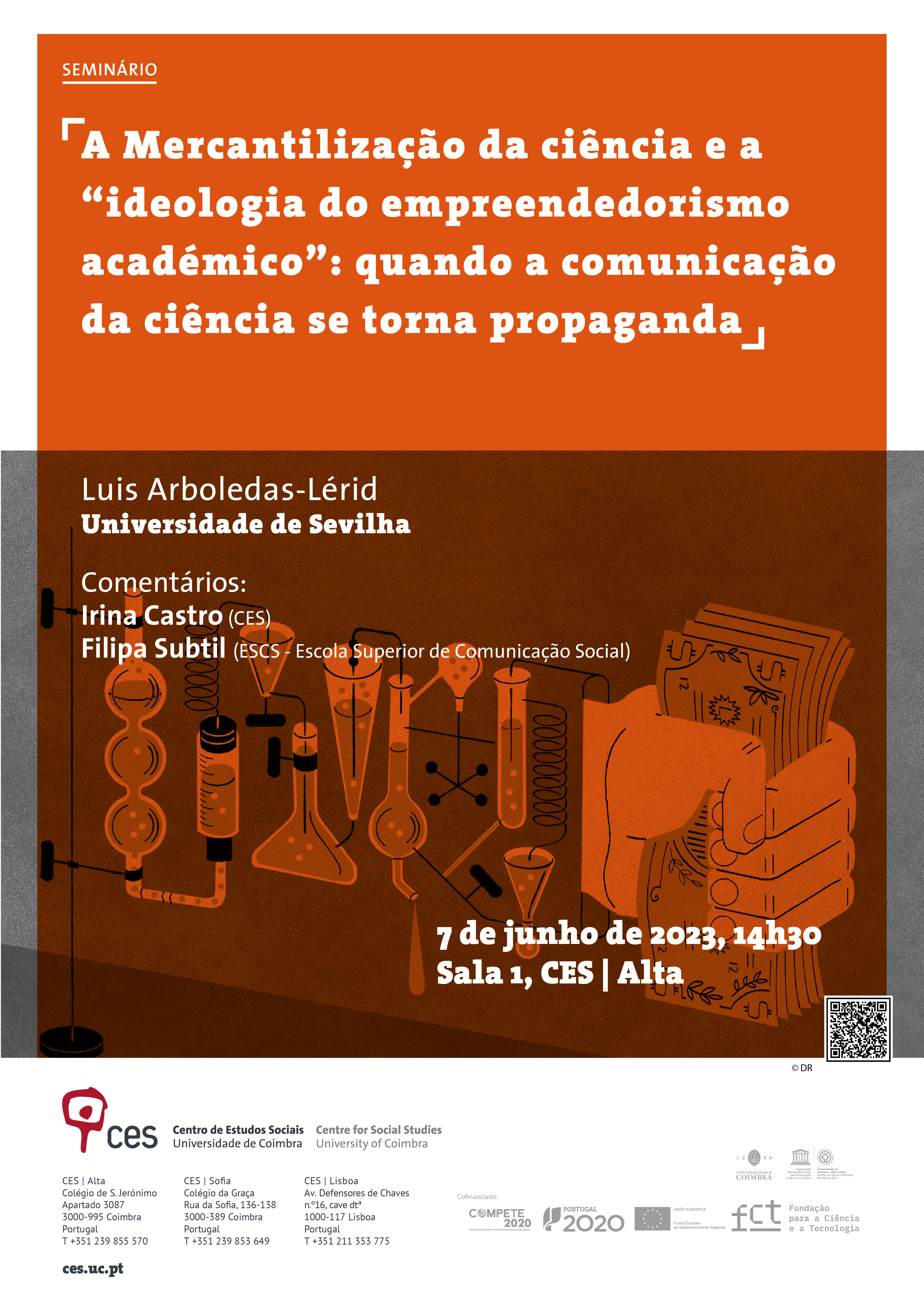Seminário
A Mercantilização da ciência e a “ideologia do empreendedorismo académico”: quando a comunicação da ciência se torna propaganda
Luis Arboledas-Lérida (Universidade de Sevilha)
7 de junho de 2023, 14h30
Sala 1, CES | Alta
Comentários: Irina Castro (CES) e Filipa Subtil (ESCS- Escola Superior de Comunicação Social, Instituto Politécnico de Lisboa e ICNOVA)
Apresentação
Alguns especialistas em Comunicação de Ciência (CdC) têm alertado que as “pressões capitalistas” a que a produção de conhecimento científico está sujeita transformam as formas e os conteúdos da CdC. No entanto, as análises e os desenvolvimentos teóricos a partir desta observação pertinente padecem de um caráter unilateral: a atenção só tem sido dada às modalidades da CdC mais próximas do marketing ou das Relações Públicas, como se a função da CdC no contexto da mercantilização da ciência e da pesquisa académica resulta-se unicamente em “vender ciência”.
O objetivo deste seminário é promover e elaborar uma nova leitura sobre Comunicação de Ciência na sua ligação com a mercantilização da ciência, propondo abordar algumas instâncias da CdC como um fenómeno de propaganda. Tal uso propagandístico seria motivado pela necessidade de disseminar a 'ideologia do empreendedorismo académico'. Para dar sentido a esta perspetiva crítica, ao longo do seminário iremos examinar as condições sociais em que se desenrola a mercantilização da ciência e a (re)integração das universidades na dinâmica da acumulação capitalista; serão investigadas as particularidades da propaganda como prática social, destacando a ligação imanente com a ideologia e, também, o papel desempenhado pela mídia na produção e divulgação da propaganda; a abordagem desenvolvida será ainda ilustrada através de uma breve análise de alguns exemplos retirados da imprensa espanhola, que atestam que, de facto, existem utilizações da CdC orientadas para a divulgação da 'ideologia do empreendedorismo académico'.
Este seminário é organizado no âmbito da Secção Temática da Ciência e Tecnologia da Associação Portuguesa de Economia Política. A secção é coordenada por Irina Castro (CES) e José Luis Garcia (ICS).
Notas biográficas
Luis Arboledas-Lérida | Investigador da Universidade de Sevilha (US). A sua investigação abrange uma vasta gama de temas e interesses em relação à ciência e à sua comunicação, tanto no que diz respeito à comunicação entre pares ('comunicação científica'), como no que diz respeito à comunicação para e com públicos não- especialistas ('comunicação de ciência'), que ele aborda a partir de uma abordagem crítica. Publicou vários trabalhos em revistas de renome internacional como Social Epistemology; e recentemente contribuiu para o livro da Palgrave, International Handbook of Marxism and Education, com um capítulo dedicado a expor a ligação essencial entre a comunicação de ciência e a subsunção formal do trabalho científico ao capitalismo. Luis Arboledas-Lérida é também professor de Jornalismo Científico na US, tendo escrito diversas análises sobre a realidade do trabalho académico em diversos jornais online, como Ctxt e El Salto.
Irina Castro | Trabalha no Centro de Estudos Sociais da Universidade de Coimbra. Em 2009 licenciou-se em Ecologia Aplicada pela Universidade de Trás-os-Montes e Alto Douro.Em 2011 concluiu o seu mestrado em Engenharia Ambiental e no mesmo ano integrou o CES como bolseira de investigação no projecto "BIOSENSE | O envolvimento da ciência com a sociedade: Ciências da Vida, Ciências Sociais e Públicos", coordendado por João Arriscado Nunes. Desde então colabora no desenvolvimento, promoção e avaliação de iniciativas de comunicação de ciência e promoção de relações ciência-sociedade, com particular incidência sobre a relação entre sociedade e a biotecnologia. Em 2022 concluiu o doutoramento no programa de Governação, Conhecimento e Inovação (ramo sociologia) no qual desenvolveu a construção ontológica das sementes transgênicas através das práticas dos/as cientistas e das controvérsias científicas. Nos últimos anos tem trabalhado em estreita colaboração com João Arriscado Nunes (CES), Rita Serra (CES) e Raúl García-Barrios, este último investigador do Centro Regional de Investigação Multidisciplinar da Universidade Autónoma do México (CRIM / UNAM). Entre 2014-2017 trabalhou como gestora de projetos do Gabinete de Gestão Projetos do CES, tendo regressado em 2020 a estas funções.
Filipa Subtil | Doutorada em Ciências Sociais (especialização em Sociologia Geral) pelo Instituto de Ciências Sociais da Universidade de Lisboa. Foi visiting scholar no Departamento de Comunicação Pública da Universidade de Navarra, Espanha (2019), na Universidade Cardinal Stefan Wyszynski , Varsóvia, na Polónia (2017-2018), no Departamento de Communication Studies da Universidade do Iowa, Iowa City (2010), e no Muhlenberg Collegue, Allentown (2008), nos EUA. Foi bolseira do PROTEC, da Fundação para a Ciência e Tecnologia, da Fundação Calouste Gulbenkian e do International Council for Canadian Studies (ICCS) - Faculty Research Program do Department of Foreign Affairs and International Trade of Canada. Entre 2014 e 2018, foi coordenadora editorial da revista Comunicação Pública. Integrou, como vogal, a direcção da SOPCOM (Associação Portuguesa de Ciências da Comunicação) (2015-2021). Foi ainda vice-coordenadora do GT de Comunicação e Política da mesma associação científica (2015-2017). Integra desde 2020 o grupo de especialistas da Comissão para a Cidadania e a Igualdade de Género. Atualmente, é directora-adjunta da revista Media & Jornalismo. Tem publicado artigos e capítulos de livros nas áreas da sociologia da comunicação, teoria social dos media e nas temáticas que cruzam os estudos de jornalismo e media com as questões de género. Co-editora e autora de Os Três D dos Media: desigualdade, desprofissionalização e desinformação (Outro Modo, 2021), Media and Portuguese Empire (Palgrave Macmillan, 2017) e a A Crise do Jornalismo em Portugal (Le Monde Diplomatique/Deriva, 2017). Em 2006, publicou o livro Compreender os Media. As Extensões de McLuhan (Coimbra: MinervaCoimbra).


